The Sinking City, from developer Frogwares, is touted as an open-world adventure game with survival horror elements. While reviewing the game, I was investigating multiple cases. I also faced off against the depraved and otherworldly denizens from the works of H. P. Lovecraft, August Derleth, and many others who’ve created the Cthulhu Mythos and tales of cosmic horror. It’s Cthulhu (plus his pals among the Ancient/Old Ones) meets C.S.I.
Unfortunately, several issues in The Sinking City — which are be explained in detail in this review — prevent it from becoming a special masterpiece. Likewise, technical issues, uninspired mechanics, and missed opportunities mean that marvelous Lovecraftian works in video game form remain a pipedream. They still wait dreaming in their house at R’lyeh.
Note: Do check out our technical review as well which looks at the various options, graphics, and performance for The Sinking City.
The Story So Far: “Who Are You? Who Who…”
You’re none other than Charles Reed, a private investigator from Boston tasked with uncovering the mystery behind the otherworldly events in the city of Oakmont. Oakmont — aka. The Sinking City — has been ravaged by a supernatural flood. Parts of the city are submerged and you can only explore its half-dozen districts by motorboat. Given the chaos and aura of dread, some citizens have begun disappearing, cultists have sprung up, and wylebeasts — vile, twisted creatures — roam the streets.
The Sinking City combines elements of sleuthing and investigative work where one case will lead you back and forth familiar avenues. As a survival horror game, ammo and health packs can be scarce. You’ll have to craft your items to make it through the story. As noted in our technical review, there’s a glitch you can exploit allowing you to stock up on items often.
Cthulhu Is Cool-hu
Among The Sinking City’s cast of characters, there are those who may have a deeper connection to Lovecraft’s works such as Throgmorton, van der Berg, or even Reed himself. While doing this review I couldn’t help but theorize if they were part of the grander arc of the mythos.
There are also characters, organizations, symbols, and even street names that’d remind you of the works of H. P. Lovecraft, August Derleth, or Robert W. Chambers — such as the Esoteric Order of Dagon (EOD), the Yellow King’s Gang and the Yellow Sign, Alhazrhed Street, and more. Heck, you’d even meet actual Innsmouth residents who’ve become Oakmont’s refugees after the town was destroyed.
The Sinking City also captures the imagery and vividness of the setting in terms of the elements of poverty and disrepair, dreariness, foreboding dread, fear, xenophobia, and psychological effects. That’s how the works of Lovecraft and his contemporaries are represented. There are various pieces of lore, cutscenes, and fluff that will make you smile with delight, and some that’d make your spine tingle with sudden fright.
The game, simply put, oozes the love and care you’d expect from fans of the stories from the aforementioned authors. There’s a mix of 1920s vibes given the setting as well as a modern take. You’ll also see in-jokes about Frogwares’ Sherlock Holmes games and its “Creepy Watson” glitches, mysteries from the lore, flaggelants walking about, citizens with their own quirks, and, yes, even an appearance by the KKK. The game does warn you early on that it tries to capture the essence of the time period, with all its bad apples included.
Baba O’R’lyeh!
Back to The Sinking City’s gameplay. As Reed, you’re given major cases, each one representing the game’s nine chapters. There are also a handful of sidequests for you to undertake.
Reed has supernatural capabilities with his Mind’s Eye, allowing you to see through reality, even things and areas that aren’t visible to humans. A mechanic known as “Retrocognition,” akin to Frogwares’ Sherlock Holmes titles, also lets you “review” the scene of the crime using silhouettes that re-enact events that have transpired. You piece together all of these clues via your Mind Palace (a panel in your menu) to come to a conclusion.
The Sinking City also doesn’t hold your hand too much. The game won’t flash waypoints and arrows to where you need to go next. In fact, certain difficulty and gameplay options remove icons completely, immersing you in some real detective work. To find out your next objective, you’ll have to use clues from documents or town registries that provide addresses. Even then, you still need to ascertain what these clues mean.
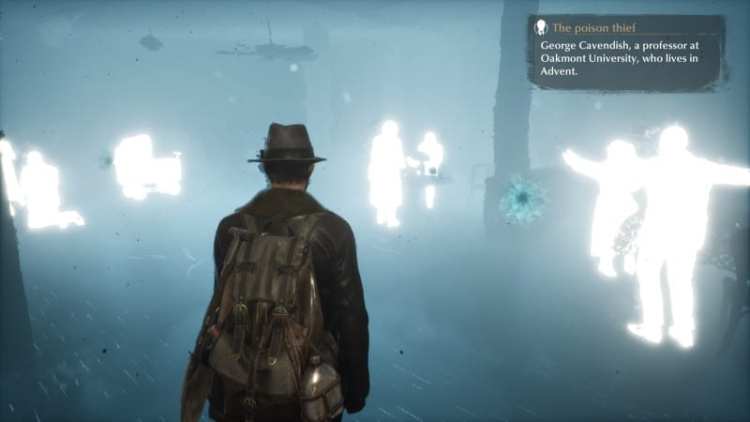
Retrocognition allows you to piece together various scenes from the recent past to find out what truly happened.
Baba O’No!
Taken separately as a feature, the above is a core strength of The Sinking City. Sadly, this core gameplay loop becomes too repetitive after a while. By the third chapter, I found myself going back to the same buildings to find the next addresses, and then doing it all over again. It’s a good thing that Oakmont’s enigmas and secrets keep you going.
Regrettably, it didn’t help matters that many of the town’s locations and services remained vastly underused. For instance, the Oakmont City Hall and Oakmont Public Library registries only have documents related to a case you’re pursuing, nothing whatsoever that would fully flesh out everything else about the city itself. That’s where certain sidequests would come in which would provide you with some lore pieces, but these were mainly collectibles or short write-ups, with end rewards being alternate costumes.
There’s never anything that would make The Sinking City truly feel like a city. It just doesn’t feel like a true open-world game. The Sinking City’s mission structure restricts player freedom that it’s more of a regular adventure game with a big map that’s underutilized. Even Oakmont’s various districts themselves don’t feel as unique as you’d want them to be, and the interiors of buildings tend to reuse assets and layouts. Several notable locations on your map aren’t even visited at all throughout the main quest. Examples would be the asylum, the guard depot, and the amusement park.
A Handful Of Bullets And Mechanics
Part of the problem is because Frogwares wasn’t able to maximize the capabilities of all the mechanics they’ve added in the game. You’re told early on that supplies are scarce and Oakmont uses a barter system by way of bullets. However, throughout the entire story, there are only two occasions when you actually end up trading with someone. The first time is to talk to a fortune teller; the second time to buy someone a beer.
You’re also told that Oakmont has its own slang that you need to understand as a newcomer, but you don’t even need to decipher clues based on language barriers. Reed also has a camera, and yet, outside of a couple of moments, you barely use this as well. Lastly, Reed has RPG-esque skill trees boosting his vitality, experience gain, and ammo carrying capacity, but this feature also feels tacked-on.
The Sinking City has some underwater locations. Now, to be fair, these tend to have some harrowing and tense moments. Unfortunately, these are also few and far between. In all cases, these involve Reed walking on the seabed, shooting tentacled fish, seeing giant tentacled beasts, avoiding hissing steam, and then reaching a cavern glowing with a green light. You don’t actually explore the depths of the flooded streets themselves. Sure, you can swim around, but you’d have your health and sanity drained.
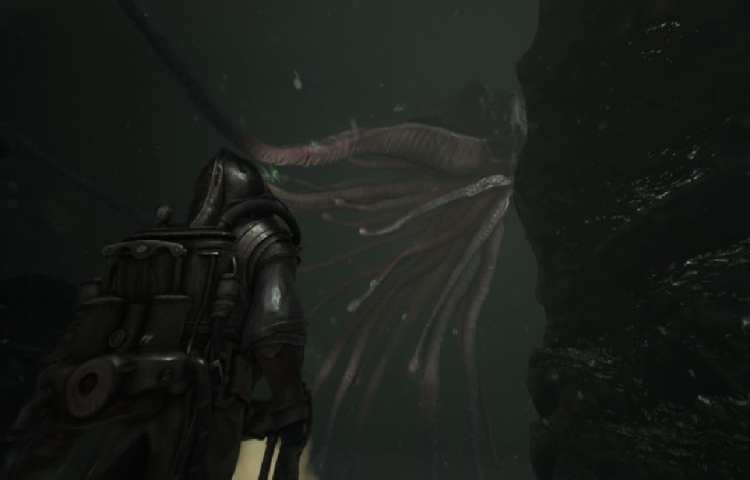
Underwater/diving sequences are few and far between, but they are some of the most captivating moments in the game.
Insane In The Membrane
Speaking of sanity, The Sinking City does have a Sanity Meter as part of both exploration and combat. When using Reed’s Mind’s Eye or encountering horrifying imagery, your sanity goes down. Sanity also drops gradually when in combat against wylebeasts. Seeing these terrifying creatures will mess with Reed’s psyche if you keep looking at them. Shooting at unarmed civilians will immensely drain your Sanity Meter as well. Although you can recover sanity over time, drops will lead to hallucinations and even death.
Some sanity effects include a distorted camera like you’re looking through a fishbowl, shadowy enemies appearing (some can even damage you), the screen becoming blurry or completely dark, or imagery of Reed committing suicide.
Sadly, a missed opportunity would be more effects similar to the ones from Eternal Darkness: Sanity’s Requiem. This meant controllers suddenly getting disconnected, save files getting “deleted,” or the TV switching off. It’s hard to believe that a game from 2002 still provides the best iteration of this mechanic.
You can view all the possible Sanity Effects in The Sinking City just by kiting monsters, staring at them, turning your back to them, and then repeating the process. You’d hardly feel surprised a few hours in.
Immortal Kombat
As far as combat goes, let’s just say The Sinking City offers a fairly rudimentary experience. It doesn’t have fluid animations like Resident Evil or other modern survival horror games. Try forcing your character to lose all their sanity and he’d just flop down on the ground without fanfare, like a marionette with its strings cut.
Also, enemy movements feel disjointed and clumsy. As mentioned in our technical review, they have very poor AI. Wylebeasts can also get kited easily, stuck in walls with their limbs clipping through textures. The Sinking City also has a couple of boss fights, if you can call them that, but these were hardly memorable.
As for your weapons, you’ve got a handful of firearms and some throwable items like grenades. The sad part is that the sound of firearms feels muffled and weak to a degree. It’s as though you’re using a peashooter instead of a shotgun.
There are also hilariously bad moments wherein wylebeasts may follow you outside of infested areas. Oakmont’s citizens won’t even notice them. When they do, they’d hardly do anything. As noted in our technical review, Oakmont’s random citizens can be an annoyance due to their tendency to pop-in depending on proximity.
Won’t Get Fooled Again
Roughly a dozen hours had passed when I finished The Sinking City’s story. With nine main cases all done, I watched one of two endings and I felt like drowning my sorrows as well. The payoff was almost too underwhelming compared to how much the game could’ve delivered. To be honest, it left me saltier than the saltwater that flooded Oakmont.
Each case or chapter allows you to choose from various outcomes. Oddly enough, these were of no consequence in the long run. Like the old Mass Effect 3 mishap, many of your decisions won’t matter at the end given that you can make some changes prior to the ending cinematic. The interesting characters you’ve met throughout your journey feel more like props once you’ve reached the conclusion. Some loose threads may even remain unresolved and some cutscenes would leave you scratching your head. There’s also no New Game+ mode, so, hopefully, you’ve got an extra save file prior to reaching the end.
Upon finishing this review of The Sinking City, I realized that it’s a game which I would consider a treat for fans of H. P. Lovecraft’s works, the Cthulhu Mythos, and various stories of cosmic horrors and nightmares from the depths. Its presentation and atmospheric tones, at times disturbing and oftentimes portraying abject misery, perfectly depict the worlds crafted by masters of ungodly visions and terrors. The Sanity Effects and investigation processes are also decent and surprising at points. They’re even psychologically jarring on a couple of occasions.
As a survival horror or open-world adventure game, however, The Sinking City only wades in knee-deep waters instead of diving in to create something truly special.
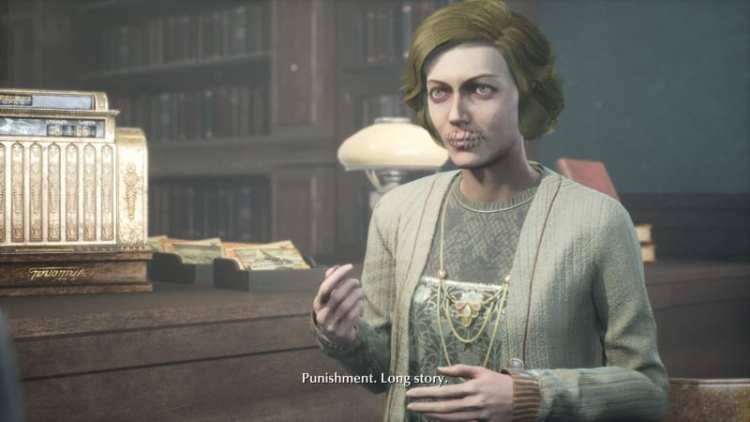
What could’ve been an NPC with a well-developed backstory just felt like someone with a unique character model. I never found out what happened to her.
Don’t forget to check out our technical review for The Sinking City. Likewise, we’ll also have a features and guides hub soon. You can find the game via the Epic Games Store.

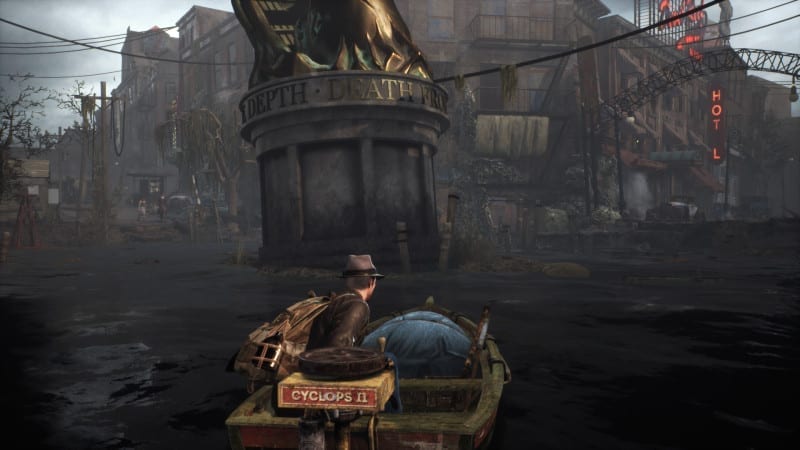
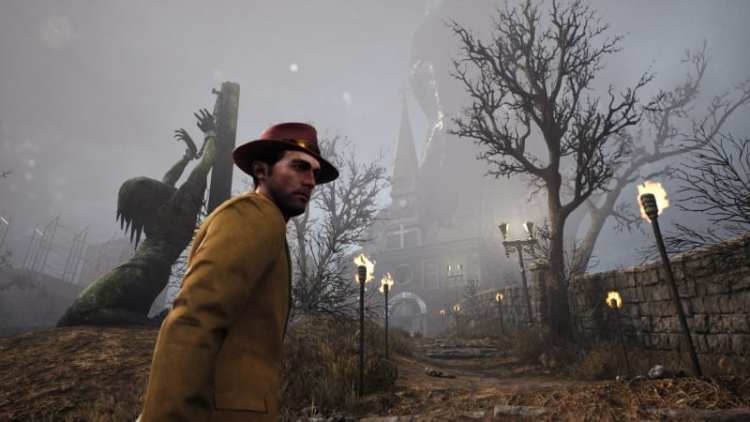
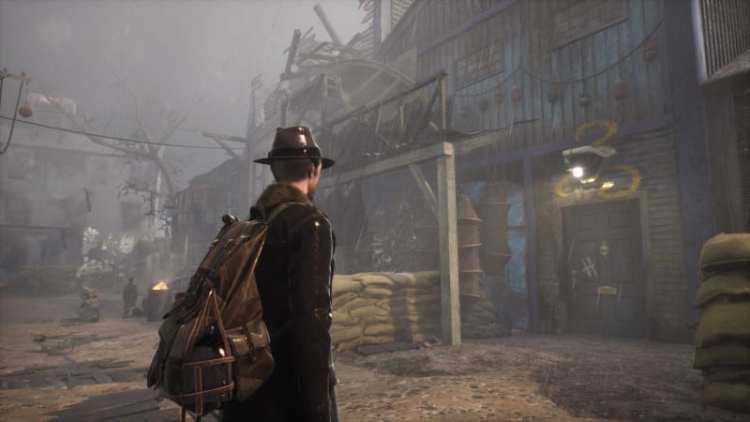
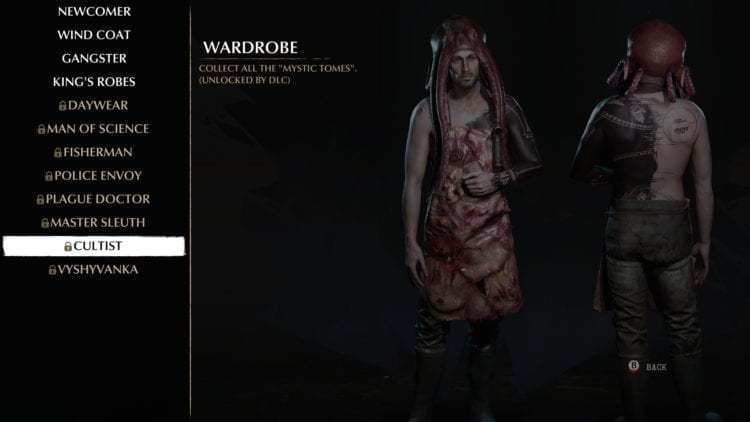
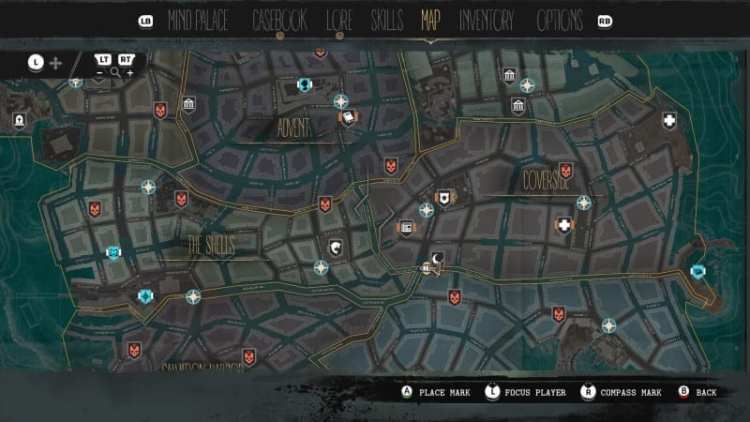
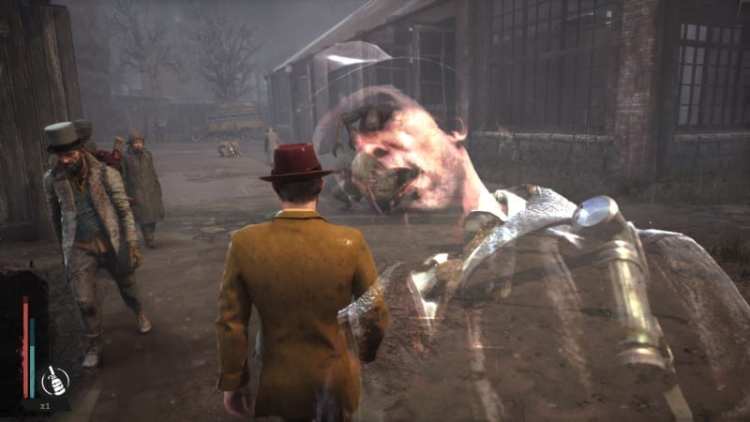
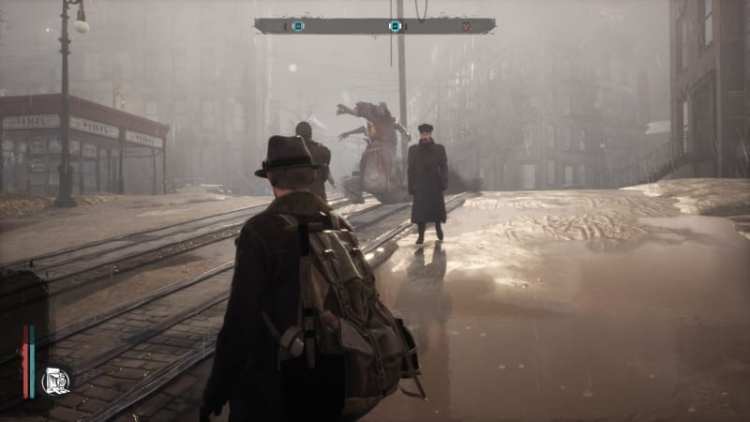





Published: Jun 25, 2019 4:01 PM UTC